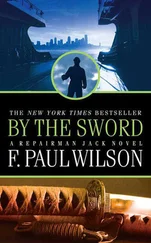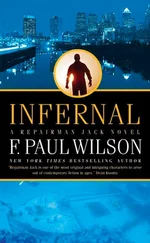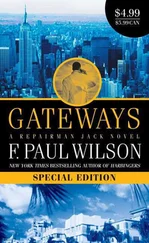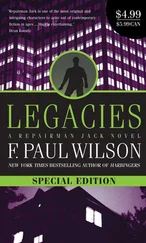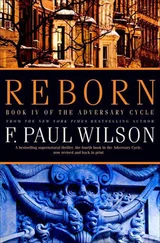F. Paul Wilson - Reprisal
Здесь есть возможность читать онлайн «F. Paul Wilson - Reprisal» весь текст электронной книги совершенно бесплатно (целиком полную версию без сокращений). В некоторых случаях можно слушать аудио, скачать через торрент в формате fb2 и присутствует краткое содержание. Жанр: Ужасы и Мистика, на английском языке. Описание произведения, (предисловие) а так же отзывы посетителей доступны на портале библиотеки ЛибКат.
- Название:Reprisal
- Автор:
- Жанр:
- Год:неизвестен
- ISBN:нет данных
- Рейтинг книги:4 / 5. Голосов: 1
-
Избранное:Добавить в избранное
- Отзывы:
-
Ваша оценка:
- 80
- 1
- 2
- 3
- 4
- 5
Reprisal: краткое содержание, описание и аннотация
Предлагаем к чтению аннотацию, описание, краткое содержание или предисловие (зависит от того, что написал сам автор книги «Reprisal»). Если вы не нашли необходимую информацию о книге — напишите в комментариях, мы постараемся отыскать её.
Reprisal — читать онлайн бесплатно полную книгу (весь текст) целиком
Ниже представлен текст книги, разбитый по страницам. Система сохранения места последней прочитанной страницы, позволяет с удобством читать онлайн бесплатно книгу «Reprisal», без необходимости каждый раз заново искать на чём Вы остановились. Поставьте закладку, и сможете в любой момент перейти на страницу, на которой закончили чтение.
Интервал:
Закладка:
"I thought I'd give it a shot," she said, suddenly uncomfortable. Even though she had every right in the world to submit a paper, she felt as if she were crashing his party.
"I'm sure it will be brilliant," he said. "Good luck."
"Sure you won't have that drink with us?" Rafe said.
"Positive. I must be off. Good night."
"A bit stiff, don't you think?" Rafe said as they watched Ev stride away.
"Maybe that's why I like him," Lisl said. "When he's around I feel like a swinger."
She resumed her search for Will but he wasn't anywhere to be seen.
Strange. He'd seemed so enthusiastic about the university film society's acquisition of a fully restored print of the Fritz Lang classic, telling her all about the recently discovered dream-sequence footage. Yet this afternoon he'd said he was going to try to make it. There had been a hint of melancholy in his voice, as if he knew there was no chance of his being there. Too bad. He'd have loved it. Lisl had once seen a shorter version on TV and hadn't been too impressed. But tonight, in a theater, in the dark with a full-size screen, the scope of the images had been mesmerizing.
To Rafe it had been some sort of epiphany.
"You know," he said, raising his voice as they walked out into the night, "I wonder if adding sound to films really improved them."
"It forced the acting to improve, that's for sure."
"True. All that mugging and those exaggerated gestures were no longer necessary. But not having sound forces the filmmaker to use the visual medium to the max. It's all he has. He can't tell you things, so he's got to show you. My new theory of film criticism:
If you can close your eyes and still follow the story line, maybe they should have saved the celluloid for some other feature and performed the script on the radio. If you can plug your ears and follow the story with your eyes only, there's a damn good chance you've got a good movie on your hands."
The couple walking ahead of them obviously had been listening, for the man turned around and challenged Rafe's theory with the titles of a number of Academy Award winners. Lisl recognized him from the sociology department. A few more of the filmgoers chimed in and within minutes Lisl found herself in the heart of a friendly but vigorous debate moving across the east campus. The whole group gravitated to the Hidey-hole where they commandeered one of the big tables and went through round after round of drinks discussing Rafe's theory and Metropolis itself.
"Visually stunning, yes," said Victor Pelham from the sociology department. "But the class-war politics are positively archaic."
"And a rip-off of H. G. Wells," said a doctoral candidate from English. "The idle rich frolicking above and the oppressed workers toiling below—it's the Eloi and the Morlocks from The Time Machine ."
Pelham said, "I don't care who he ripped off—a socialist like Wells or Marx himself—that class-war bullshit has been passe for ages. A shame, too. It hobbles the film."
"Maybe it's not as passe as you think," Rafe said.
"Right!" Pelham laughed. "Will the real Overman please stand up."
"I'm not talking about anything so crass as Overmen and Undermen," Rafe said softly. "I'm talking about Primes and non-primes—or, for the sake of simplicity and clarity, Creators and Consumers."
The table fell silent.
"That's where the real division lies," Rafe continued. "There are those who innovate, invent, modify, and elaborate. And there are others who contribute nothing, yet enjoy all the benefits of those innovations/inventions, modifications, and elaborations."
"Sounds like another variation on the Eloi and Morlocks," someone said. "Creators on top, consumers below."
"Not so," said Rafe. "That implies that the Consumer masses are slaves to the Creator overlords, but it doesn't work that way. The Creators are in fact the slaves of the masses, providing them with all the benefits of art and modern science. The Wellsian cliche of the Eloi elite owing their comfortable life-style to the labor of the Morlock masses is backward. The Consumer masses owe their health, their full bellies, and the comforts of civilization to the efforts of the small percentage of Creators among them."
"I'm confused," someone said.
Rafe smiled. "It's not a simple concept. Nor is it a clear-cut division. The dividing line is nothing so obvious as economic status. Creators have often reaped fame and profits from their work, but throughout history there have been countless Creators who've lived out their entire lives in obscurity and abject poverty. Look at Poe, at Van Gogh; think of the mathematicians and physicists whose work Einstein studied in laying the groundwork mat led to his theory of relativity. What are their names?"
No one answered. Lisl glanced around the table. All eyes were fixed on Rafe, everyone mesmerized by his voice.
"And far too many of the wealthiest among us are nothing more than overfed Consumers. Those who have merely inherited their wealth are the most obvious examples. But there are others who've supposedly 'earned' it who are just as useless. Take the Wall Street types—the stockbrokers and arbitrageurs: They spend their lives buying and selling interests in currencies or in concerns that actually produce things, they pocket their commissions, they cash in on the spread, but they produce nothing themselves. Nothing at all."
"Nothing but money!" Pelham said, evoking a few muted laughs.
" Exactly !" Rafe said. "Nothing but money. A whole life of six, seven, eight decades, and what besides a big bank account have they left behind? After their assets are gobbled up by their greedy little Consumer heirs, what mark have they left in their wake? What evidence is there to indicate that they ever passed this way?"
"Not much, I fear," said a middle-aged woman with red hair. Lisl recognized her as being from the philosophy department but couldn't remember her name. "If I may quote Camus: 'I sometimes think of what future historians will say of us. A single sentence will suffice for modern man: He fornicated and read the papers.'"
"And if I may paraphrase Priscilla Mullin," said Rafe. "Speak for yourself, Albert."
Amid the laughter, Pelham said, "Are you serious, or are you just trying to rattle the cage as you did with your sound-as-a-detriment-to-filmmaking theory?"
"I'm quite serious about both."
Pelham stared at him, as if waiting for Rafe to smile and laugh it all off as a joke. Lisl had a feeling he might have a long wait.
"Okay," Pelham said finally. "If all this is true, why haven't these Creators taken over the world?"
"Because they don't know who they are. And because too many of them have learned over the years not to reveal themselves."
"Why on earth not?" Lisl said.
Rafe's eyes poured into hers.
"Because they've already been crippled or damaged by the masses of Consumers who try to destroy any trace of greatness in others, who do anything they can to douse the faintest spark of originality, no matter where they find it. Even in their own children."
Lisl felt as if a bell were chiming in a remote corner of her past, toning in resonance to Rafe's words. It made her uncomfortable.
"I've consumed too many drinks to create a cogent rebuttal," said someone at the far end of the table. He turned to his date. "Want to dance?"
They headed for the postage-stamp dance floor and began to sway to a slow tune on the jukebox. A few others followed; those who didn't said good night and departed.
And left Lisl and Rafe alone at the table.
Lisl glanced around the dimly lit tavern, at its college memorabilia -strewn walls, at the dancers on the floor. When she turned back to Rafe she found him staring at her over the rim of his glass. His eyes glistened in the neon light. The scrutiny made her uncomfortable.
Читать дальшеИнтервал:
Закладка:
Похожие книги на «Reprisal»
Представляем Вашему вниманию похожие книги на «Reprisal» списком для выбора. Мы отобрали схожую по названию и смыслу литературу в надежде предоставить читателям больше вариантов отыскать новые, интересные, ещё непрочитанные произведения.
Обсуждение, отзывы о книге «Reprisal» и просто собственные мнения читателей. Оставьте ваши комментарии, напишите, что Вы думаете о произведении, его смысле или главных героях. Укажите что конкретно понравилось, а что нет, и почему Вы так считаете.



